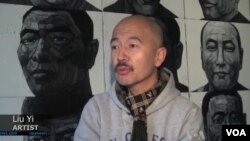BEIJING —
On the fifth anniversary of violent protests against Chinese rule in Lhasa, Tibet, authorities are still grappling with unrest and a wave of self-immolations in Tibetan areas of China. One Beijing-based artist is trying to commemorate the lost lives.
More than 100 Tibetans have set themselves on fire in protest of Chinese government policies. Artist Liu Yi wants to tell their story.
"The main message that I am trying to convey is the truth about what is going on in Tibet. The other thing that has really struck a chord in me emotionally is that none of these self-immolators have done this for themselves. It is done out of love," said Liu.
He has painted portraits of each of the immolators. Liu grew up in Langzhou, Gansu Province, near Tibetan areas and is a practicing Buddhist.
Previously, his paintings focused on victims of the Sichuan and Yushu earthquakes.
"Another reason is to give Chinese a chance to pay more attention to this issue, and to have empathy for what is happening, to help them put themselves in the shoes of Tibetans and ask, if we were them, what would we do," he said.
That sentiment is rare in China, where state media vilifies the immolators and those who support them as criminals. In Beijing, few residents know about or express sympathy for the Tibetan situation.
"We live so far away from Tibet, and it’s not a part of our daily lives. Those things are so small. I don’t know much about this issue," said Han, a Beijing resident.
"I think it’s all a lie," said Zhang, another Beijing resident. "Why don’t those who are encouraging others to self-immolate instead set themselves on fire?"
Chinese authorities blame Tibet’s exiled spiritual leader, the Dalai Lama, for orchestrating the protests. Officials insist that the solution to Tibet’s problems is not greater religious or political freedom, but economic development - something that Tibet officials like Baima Chilin emphasized during this week’s National People's Congress.
"In Tibet government officials must thoroughly study their comrades’ policies in the eastern coastal regions of China. Tibet must let investors come and get rich, because if investors get rich, Tibet develops, and if investors get richer, Tibet develops even more," said Baima Chilin.
China’s new leaders are expected to continue a hardline approach on Tibetan protesters, and artist Liu Yi is expected to continue working in his studio, despite threats from police. He says he will keep painting until the immolations stop.
More than 100 Tibetans have set themselves on fire in protest of Chinese government policies. Artist Liu Yi wants to tell their story.
"The main message that I am trying to convey is the truth about what is going on in Tibet. The other thing that has really struck a chord in me emotionally is that none of these self-immolators have done this for themselves. It is done out of love," said Liu.
He has painted portraits of each of the immolators. Liu grew up in Langzhou, Gansu Province, near Tibetan areas and is a practicing Buddhist.
Previously, his paintings focused on victims of the Sichuan and Yushu earthquakes.
"Another reason is to give Chinese a chance to pay more attention to this issue, and to have empathy for what is happening, to help them put themselves in the shoes of Tibetans and ask, if we were them, what would we do," he said.
That sentiment is rare in China, where state media vilifies the immolators and those who support them as criminals. In Beijing, few residents know about or express sympathy for the Tibetan situation.
"We live so far away from Tibet, and it’s not a part of our daily lives. Those things are so small. I don’t know much about this issue," said Han, a Beijing resident.
"I think it’s all a lie," said Zhang, another Beijing resident. "Why don’t those who are encouraging others to self-immolate instead set themselves on fire?"
Chinese authorities blame Tibet’s exiled spiritual leader, the Dalai Lama, for orchestrating the protests. Officials insist that the solution to Tibet’s problems is not greater religious or political freedom, but economic development - something that Tibet officials like Baima Chilin emphasized during this week’s National People's Congress.
"In Tibet government officials must thoroughly study their comrades’ policies in the eastern coastal regions of China. Tibet must let investors come and get rich, because if investors get rich, Tibet develops, and if investors get richer, Tibet develops even more," said Baima Chilin.
China’s new leaders are expected to continue a hardline approach on Tibetan protesters, and artist Liu Yi is expected to continue working in his studio, despite threats from police. He says he will keep painting until the immolations stop.




